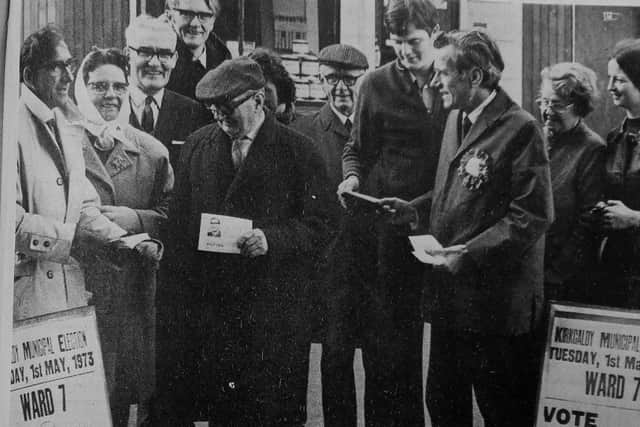1973 council election which saw Labour lose control in Kirkcaldy as SNP emerge
and live on Freeview channel 276
SNP candidate Iain McGarry defeated housing convener Bailie David Westwood by just 89 votes to tilt the balance of power - and it was close to a double for the Nationalists as they pushed David Stewart, standing for the first time, all the way to a recount before he was safely home by just 31 votes.
The election also saw the Tories gain their first ever seat on the council as William A. Ferguson, who formerly sat as a member of the successful Ratepayers Association, donned a blue rosette and held his seat in a straight fight with Labour.
Advertisement
Hide AdAdvertisement
Hide AdIt was the last municipal election before the 1974 re-organisation of local government, and it left the Town House with an intriguing set-up. Labour and the Ratepayers’ Party each held 14 seats - the balance of power now rested with the two ward winners.


Councillor Ferguson was expected to vote with his former Ratepayer colleagues on most issues, but the SNP’s newest councillor was a different proposition altogether. New to the chamber and very much an unknown quantity, if he chose to align himself with Labour then the casting vote of Provost, John Kay, would ensure the status quo prevailed.
But if he went against Labour, all bets were off. The pressure was on.
In an editorial, The Fife Free Press described him as “the key man” adding: “When Councillor McGarry offered himself for election, he could hardly have visualised that, this early in his political career, he would become such an important figure in Kirkcaldy’s municipal affairs. It is a responsible position for such a young man, but, if he has a heavy responsibility, he also has a great opportunity, both for his party and for himself. Let him grasp it with both hands. He is a Scottish Nationalist - do not let us lose sight of that - but if he uses his crucial vote wisely, and in the best interests of Kirkcaldy no-one will surely complain.”
Advertisement
Hide AdAdvertisement
Hide AdThe Provost also spoke of “the serious responsibility” on Cllr McGarry’s shoulders but didn’t hold out much of an olive branch to the SNP, starting they had “created a sort of personality cult” and fought on the issue of personality rather than issues.
The result clear stung Labour. By its own admission, the SNP was almost non-existent in February of 1973. By May they’d rattled cages at the Town House, and had plans to field more candidates in the next election.
Turnout for the poll was the poorest for many years at just 39.3 per cent. Ward five saw just 26 per cent of voters turn out for what was a historic count. For the first time in a decade there were contests in all ten wards, featuring a total of 22 candidates.
The Communist Party pitched its hat into the ring in one ward, and got short shrift from the electorate, barely mustering 70 votes, and the Tories didn’t do anywhere near as well as they had hoped, despite the success of electing Cllr Ferguson.
Advertisement
Hide AdAdvertisement
Hide AdTommy Horne, general manager of Kirkcaldy Ice Rink, stood as a Tory candidate, but came in well behind the winner, Robert deas (Lab) Burntisland, meanwhile saw Labour sweep all five seats,with the lowest poll ever recorded in town. Buckhaven and Methil remained a 12-man, one-party town, and Labour also retained control in Leslie. Lochgelly, as ever, stood apart, electing Communists to three of its four seats.